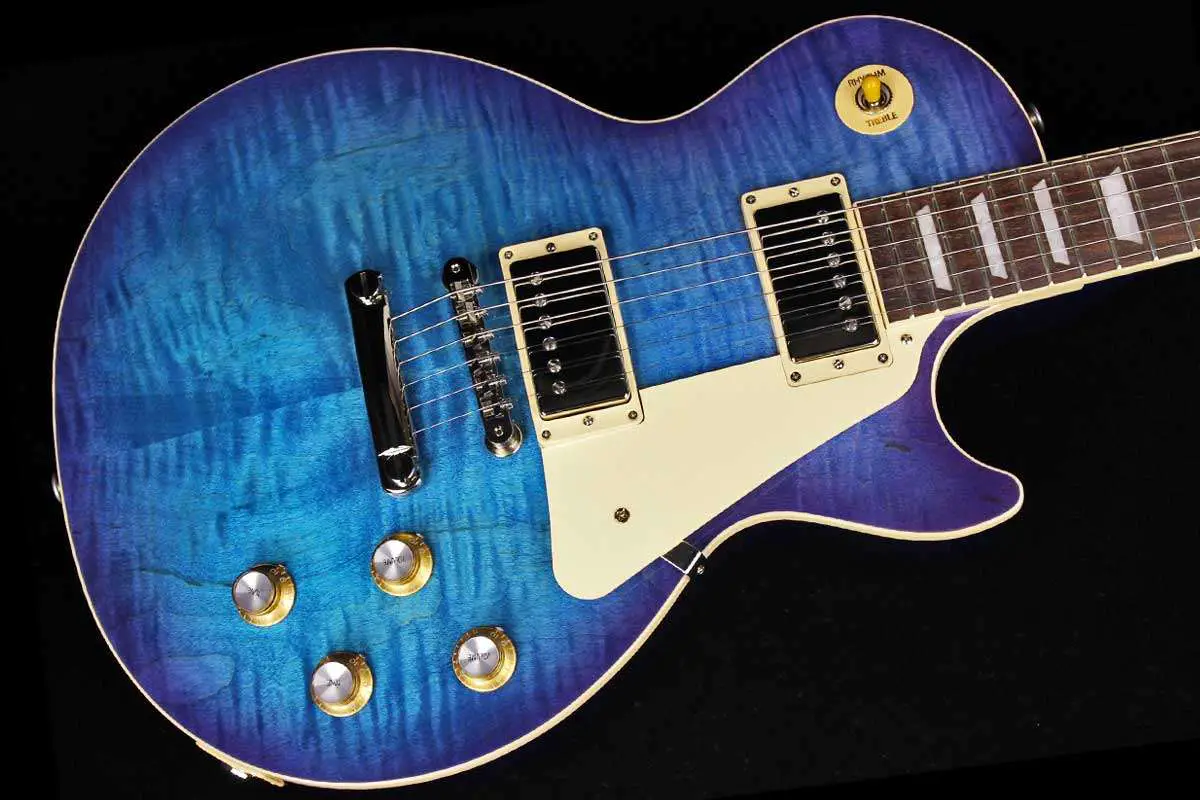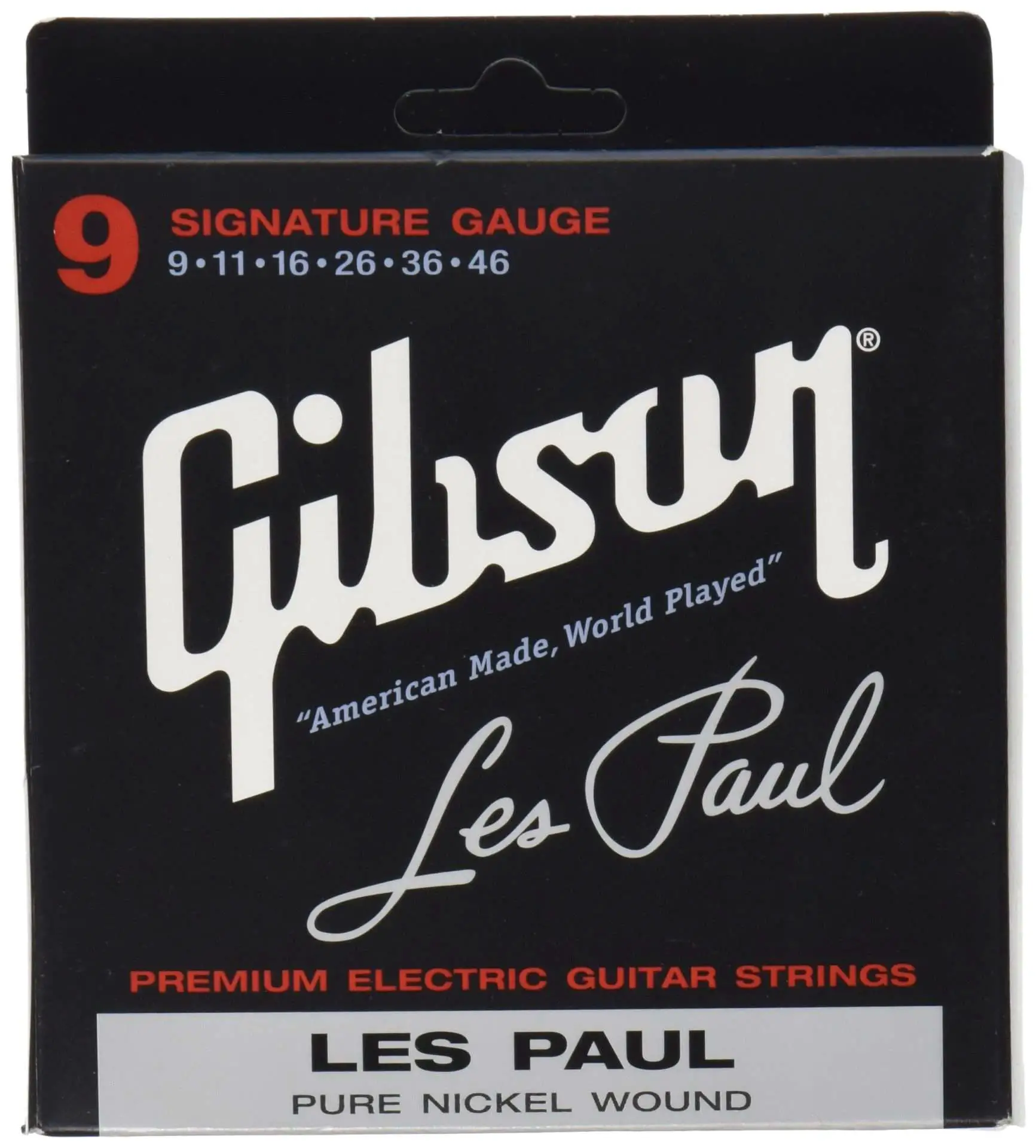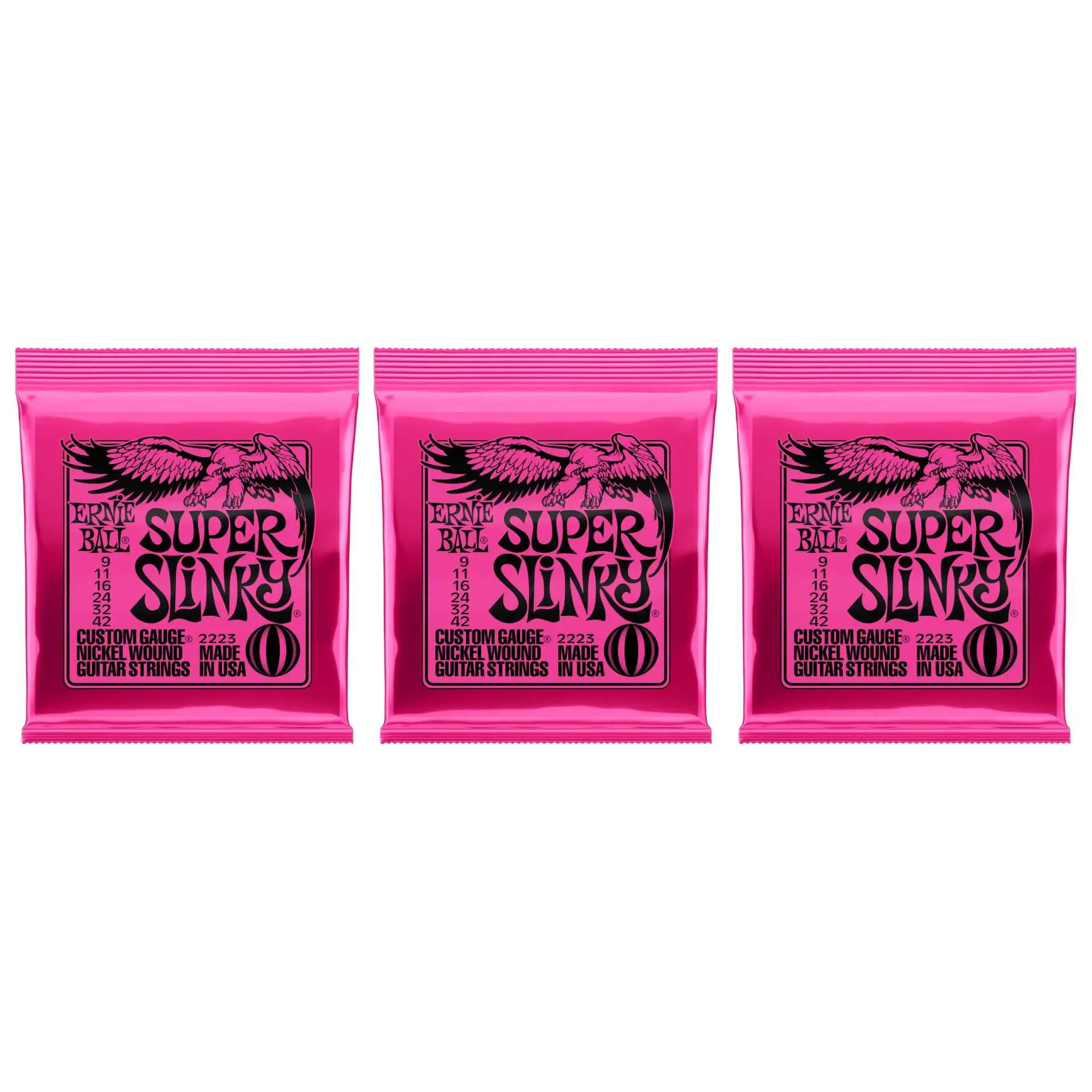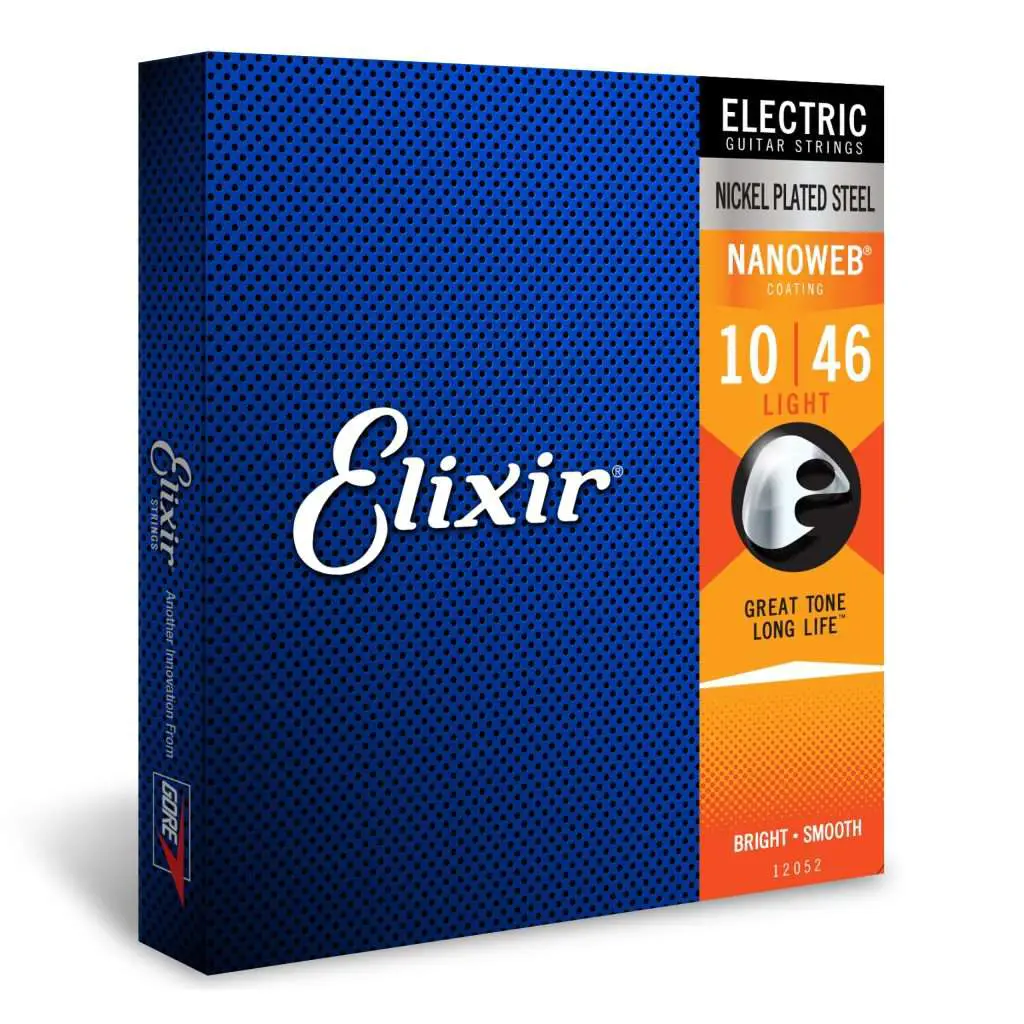Selecting the best strings for a guitar is crucial for shaping its tone & playability. This decision holds even greater significance for the legendary Les Paul, celebrated for its lush, resonant tones & iconic shape. With its solid mahogany body and maple top, the Les Paul is known for its dense, distinctive sound, underscoring the importance of choosing the right strings to either enrich or harmonize with its inherent characteristics. When seeking the best strings for Les Paul guitars, it’s essential to consider how they can elevate the instrument’s renowned sound.
String gauge plays a substantial role in a player’s experience; heavier strings yield more volume and sustain, while lighter gauges are easier to play and facilitate faster playing styles. It’s important to note that the optimal string gauge isn’t a one-size-fits-all scenario—it greatly depends on personal preference, playing style, and the desired sound. Consequently, navigating through the plethora of options can be daunting, and understanding the nuances of string gauges and materials becomes crucial in your decision-making process.
When selecting strings for a Les Paul, consider factors such as string tension, tone, and the physical feel under your fingers. It’s a balancing act of matching your playing style & tone preferences with the specific sonic characteristics of the Les Paul. The intersection of these considerations will guide you toward discovering strings that complement your instrument and enhance your musical expression.
Having delved into the various aspects that influence the string selection, we emerge with insights tailored to help you harmonize string choices with the unique requisites of a Les Paul. Moving forward, we focus on specific string sets that have been tried, tested, and shown to bring out the quintessential qualities of this venerable guitar, thereby enabling you to make an informed choice.

Top Strings for Your Les Paul
We’ve meticulously gathered a selection of the finest strings that will bring out the nuanced tones and sustain of your Les Paul guitar. Our list represents the best options available, each offering its unique benefits to enhance your playing experience. Whether you’re searching for bright, singing highs or rich, growling lows, these strings promise to complement the legendary Les Paul sound.
Gibson LP Signature Gauge Strings

If you’re passionate about the Les Paul tone, these strings are a solid choice for their warm and punchy sound.
Pros
- Wound with pure nickel for that classic Les Paul warmth
- Silk-wrapped ends minimize unwanted noise
- Made in the USA for guaranteed quality
Cons
- Some users experienced early breakage with the high E string
- Might require slight tuning adjustments over time
- Price point may be higher compared to some other brands
When we strung up our Les Paul with Gibson’s signature gauge strings, the difference was noticeable from the first chord. The punch these strings deliver is fitting for rock and blues genres, and they bend with ease, making for a smooth playing experience.
We appreciated the minimized finger noise, thanks to the silk-wrapping on the ends. This attention to detail is what you would expect from a brand with Gibson’s storied reputation. These strings allow for expressive playing without the distraction of excess noise.
As long-time players, we know that finding the right string gauge is pivotal. Gibson also offers these in a size 10 for those who prefer a thicker string, adding versatility. These strings held their tone through several jam sessions, and while there was some wear, it was in line with normal expectations.
Playing our Les Paul with these strings felt like a nod to the past, with a tone that’s as rich as the guitar’s history. The warmth is unrivaled, and the nickel-wrapped construction is sturdy. A few of us had concerns over tuning stability, but that’s a small trade-off for the quality of sound that these strings produce. Remember to handle the high E with care, as its thinner gauge can be delicate.
Ernie Ball Super Slinkys

If you’re looking to revitalize your Les Paul with strings that offer a perfect blend of tone and durability, these are a smart pick.
Pros
- They maintain a bright sound and balanced tone over time.
- The Super Slinky gauge allows for easy bends and a smooth playing feel.
- The three-pack offers great value, saving trips to the shop.
Cons
- May not suit players who prefer heavier gauge strings for lower tunings.
- Nickel plating can cause allergies for very sensitive players.
- They might not be the best choice for ultra high-output playing styles.
We’ve recently strung up our Les Paul with a fresh set of Ernie Ball Super Slinkys, and the guitar feels reborn. The strings resonate with a pristine clarity that truly complements the classic warmth of the Les Paul. From our experience, these strings have provided unwavering reliability whether we’re riffing through blues progressions or dialing up the gain for heavier rock sounds.
What stands out most for us is the Super Slinky gauge’s versatility; these strings facilitate effortless bendings and vibratos without sacrificing fullness in tone. We recognize their consistency during extended playing sessions too – a testament to their enduring quality.
Budget-wise, the three-pack format is our go-to. Not only do we avoid the hassle of frequent purchases, but we also strike a balance between cost-efficiency and the premium quality demanded by the rigorous standards of our playing. While some may opt for heavier strings to cater to specific genres or tunings, the Ernie Ball Slinkys are our recommendation for most guitarists looking for a reliable set of strings for their Les Paul.
D’Addario XL Nickel Strings

We believe these strings are an excellent choice for Les Paul players seeking a blend of reliability and tonal quality.
Pros
- Bright, versatile tone suitable for various genres
- Hex-Core technology ensures perfect intonation and consistency
- Made in the USA, guaranteeing high manufacturing standards
Cons
- Some players might prefer a different gauge for specific styles
- Might not suit players looking for a more specialized string type
- Durability could vary depending on playing intensity and maintenance
As someone who’s played on a lot of different strings, the impact of a fresh set on your tone cannot be overstated. The moment we strung our Les Paul with the D’Addario XL Nickel Electric Guitar Strings, we were greeted with a bright and clear sound that breathed new life into our guitar. These strings offer a brilliant versatility that handles everything from blues to hard rock with ease.
Their proprietary Hex-Core was evident through the strings’ stability and consistency. The tuning stayed true through bends, hard riffing, and lengthy playing sessions. It’s refreshing not to worry about strings going out of tune in the middle of a jam or recording session.
The fact that they’re made in the USA is a reassuring touch, indicating a level of quality and consistency in production. However, what truly sets these D’Addario strings apart is their adaptability to various playing styles and preferences. They’re also available in a variety of gauges, satisfying the needs of virtually any player looking to customize their sound.
In all our time testing guitar strings, these seem to strike the right balance for players who need a reliable all-around string for their Les Pauls. If you’re in the market, give the D’Addario XL Nickel Electric Guitar Strings a try; they could be the next great addition to your guitar’s sound.
Elixir Light Coated Electric Strings

If you value long-lasting vibrant tone and robust durability in your Les Paul, these strings are a must-try.
Pros
- Extended tone life
- Resilient to corrosion
- Stable tuning under various conditions
Cons
- Slightly higher price point
- May feel different to traditionalists
- Coating could alter string sensation for some players
Switching to Elixir’s Light Electric Strings on my Les Paul was transformative. The NANOWEB coating has this uncanny ability to preserve the brightness of new strings. It’s more than just protection from grime and oils; it’s like a force field maintaining that initial sparkle. On stage or just jamming at home, our band noticed how my solos cut through with an extra zest—a testament to the strings’ dynamic punch.
There’s always a bit of skepticism about how strings claim to resist the elements, but these stood their ground. After weeks of humid rehearsal rooms and temperature swings at venues, the strings remained defiantly corrosion-free. It’s reassuring to not worry about an emergency string change mid-performance.
Tuning stability is another hallmark. I’ve bent notes to their limit and assaulted them with fast licks, but tuning drift just doesn’t seem to be in the vocabulary of these strings. It’s a real time-saver not having to constantly adjust mid-session, preserving our momentum and concentration on the music.
For those curious about the technological side of these strings, the NANOWEB coating offers more insights. It’s fascinating to see how Elixir continuously evolves its string technology to meet the demands of modern guitarists.
Buying Guide
Understand String Gauges
When we select strings for a Les Paul, gauge is a critical factor. String gauge refers to the thickness of the strings, measured in thousandths of an inch. The standard gauges range from .008 (also referred to as “8s”) to .013 (“13s”), with several variations in between. Lighter strings (.008-.042) are often preferred for their ease of playability and bending. Heavier strings (.010-.046), known as “10s,” provide a fuller tone and are favored by many players for their sustain and impact in rhythm playing.
Assess Your Playing Style
Consider our playing style when choosing string gauges. If we prefer playing with a lot of bends or vibrato, lighter strings might be more comfortable. For rhythm players who enjoy a thicker tone and don’t bend notes as often, a heavier set may be more appropriate.
Factor in Tension and Tone
We shouldn’t overlook string tension and tonal preferences. Higher gauge strings have more tension and can produce a thicker tone, which some players believe contributes to better sustain. However, a poll on string preferences shows that approximately 48% of players opted for 10s on their Les Paul, with 22% choosing 9s, and 11s being the 3d choice at 9%. It suggests that while string gauge is a matter of personal preference, there are common trends within the Les Paul community.
Personal Comfort and Guitar Setup
Personal comfort is paramount, and so is considering the guitar’s setup. Different gauges may require adjustments to the Les Paul’s truss rod, action, and intonation to play optimally. We recommend consulting with a professional or referring to the manufacturer’s recommendations if we’re unfamiliar with guitar setups.
Experimentation is Key
Finally, experimentation can lead us to our preferred choice. Since no two players are alike, trying out various string gauges could be the best way for us to discover what works best for our hands and our music. It’s about finding a balance between playability and the desired sound. Remember, a Les Paul is versatile, and so is our choice of strings.
| Gauge | Tone | Playability | Sustain |
|---|---|---|---|
| 8s | Lighter | Easier Bends | Less |
| 9s | Balanced | Comfortable | Good |
| 10s | Fuller | Higher Tension | Better |
| 11s | Thickest | Less Bendy | Best |
Choosing the right string gauge allows us to express our music comfortably and confidently. It’s a subtle yet impactful element in crafting our sound.
